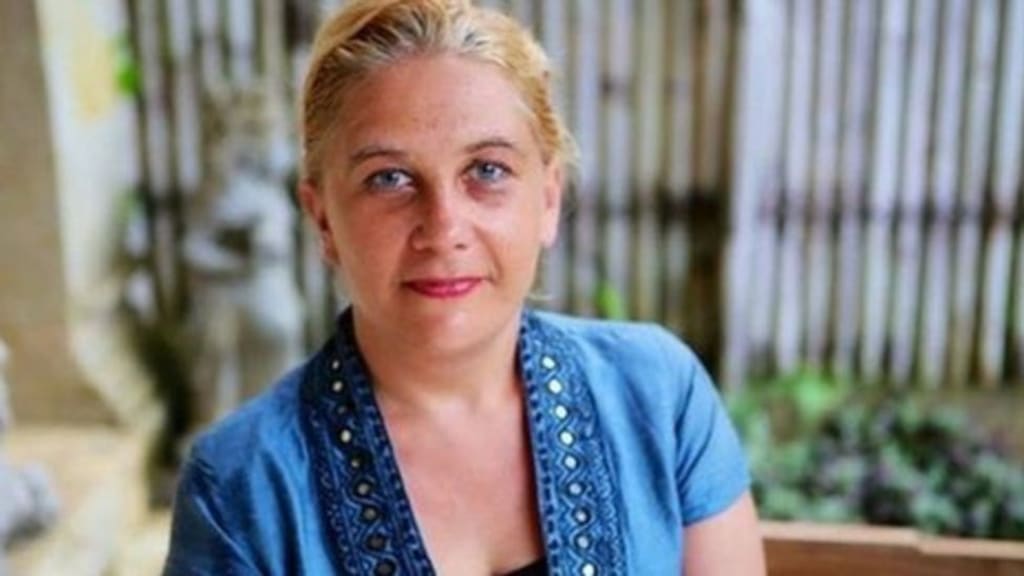Murder in Bali
never say goodbye to a hero

Anne-Marie contacted me through Facebook, inquiring about renting my villa in Bali. We agreed to meet a few days later at the Monkey Forest in Ubud, Bali.
When we first met, I learned that she was from London, single, and had no children.
She described herself as a teacher who traveled the world teaching English to kids.
“I’ve been traveling in Asia for the past year,” she told me. “I had been a teacher in Vietnam. I’ve traveled the back roads of Cambodia, and lived in Nepal.”
She gave me a rental deposit — and a hug — and said that she’d be back in two months.
In the short time, I spent with her, she struck me as the role-model teacher who could have helped me as a struggling youth.
She seemed like the teacher who could change your life. The teacher you never forgot.
The one for whom you spent the day polishing the biggest, brightest, red apple to place on her desk. I sensed that she could bring out the best in her students.
When she returned she was ill. In Nepal, she was hospitalized for more than two weeks with dysentery.
She had black rings under her eyes. It was part of the lingering, visible effects of dehydration and exhaustion.
I showed her around the villa.
After a few minutes, she stretched out on the couch and propped her head up on a pillow. Her voice was raspy from even that little bit of exertion.
She said she started to “feel bad” again a few days earlier. I gave her the number of the local clinic and suggested she go there if she still felt ill in the next few days.
Then I asked her about her plans for this stay in Bali.
“I have ideas for new art in the education business in Bali,” she explained. “I’m also interested in creating a foundation in Nepal that will help disadvantaged youth.”
“I plan to use film and drama.” She added, “Also, I want to work on my book. It’s about my parents. I have some serious issues I want to work out.” She asked whether I knew any therapists.
I told her I was working on a book, too, and offered to help with her writing. I also shared that I had issues to resolve with my parents I was working on.
During the next two days, I often checked in on her.
She was diagnosed with a viral form of dysentery and a bladder infection. She received antibiotics for the infection.
Several more days passed.
While she recovered, I continued to stop by, cleaned the villa, and changed her linen. I also found a maid to cook and run errands for her until she felt better.
The antibiotics must have helped because she perked up and planned to soon renew her visa in Bangkok.
May 21, was the Balinese holiday of Galungan.
The maid went to the villa to make the traditional ceremony for the victory of dharma over adharma. This marks when the ancestral spirits visit the Earth.
Because Anne-Marie’s motorbike was gone, the maid assumed she was out. She noticed that the door was open, but suspected nothing amiss.
On May 22, at 4 p.m., she did not answer my second phone call. I went over to check in on her and bring fresh towels. When I arrived, her motorbike was still gone. The doors were wide open and one of the sliding glass doors became unhinged.
I shouted from the steps
Out of concern, I stepped in and look around. I entered the living room, past the open bedroom door.
I looked closer and froze in terror.
Her lifeless body lay on the bedroom floor, her face covered with a black cloth.
My adrenalin kicked in, my heart pounded, and my fists clenched in sweat-drenched fear.
I fumbled for my cell and realized I hadn’t brought it. The landline worked, but I thought it quicker to steer straight for help in person.
I met the owner of a nearby resort, where I got out a few stutter-gasped details.
He called the police.
After the police inspected her body they said, “She is the first foreigner murdered in Ubud.”
At the police station, I was interrogated until the sun rose.
I cooperated and offered information. I sat next to a young Balinese officer who took my statement down on his manual typewriter.
The non-English-speaking detective struggled to get my facts straight.
Occasional break-ins and purse snatchings are troubling enough. I sensed that the Ubud police felt as though their reputation was on the line; the safety of Ubud itself.
“Is this a witness statement or a confession of guilt?” I asked. “Do I need a lawyer?”
The detective pointed to a word at the top of the document, Saki (witness) statement.
The station lights flickered, the toilet had no water, and the Internet was dead.
At least using a manual typewriter was faster than writing down statements by hand.
I thought to check Anne-Marie’s cell phone.
To my disbelief, her phone was active. I heard ringing, but no answer. Five minutes later, came the return call. I jumped up and handed the detective her phone.
Why the police didn’t check her phone first, I had no idea.
Whoever called back hung up.
I hoped that they had a GPS tracking capability.
When the police obtained a copy of Anne-Marie’s I.D., they confirmed that the dead woman was the same. Evidence, they said, indicated that she was beaten, raped, strangled, and robbed.
Another problem for me was Anne-Marie failed to register her passport with the police when she moved in. They blamed her undocumented residence on me and the US 20,000 fine that came with it.
The police let me return home and placed me under “soft house arrest.” I was not under suspicion, free to move about as pleased, but did not want to leave Bali.
I was also sworn to silence.
Anything I said that conflicted with police statements was interfering with police business. That could subject us both to jail time, and, in my case, deportation.
The first break came when the Balinese construction boss lied about a worker he hired. The worker came from Jakarta.
His real name was Hambali.
Because he had a criminal record for theft he often worked under assumed names.
The next break came when police traced Anne-Marie’s phone and her motorbike.
Several days later, police caught the suspect throwing a party for his friends in Jakarta.
Anne-Marie Drozdz death: Police arrest 32-year-old man on suspicion of murder over British teacher ‘strangled to death’ in Bali — Independent
Upon interrogation, Hambali confessed he broke away from the Ubud construction crew and hid.
After dark, he returned to the building site alone on Monday, May 21. Committed the crime Tuesday night, May 22, and then left Bali afterward with Anne-Marie’s motorbike.
Police also arrested the next-door construction boss.
Man arrested after death of British teacher in Bali — Guardian
On June 9, 20 days later, police escorted Hambali to my villa to reenact the crime.
He arrived in handcuffs, head down, and avoided eye contact. Chills ran through me when I immediately recognized him in his orange prison suit.
He was the same worker who promised, “Don’t worry, boss. I will watch over your house.” His name was not Samsul, as he had said; it was Hambali.
The 32-year-old criminal looked more like a street beggar than a person capable of murder. Hambali was short and paper-thin; less than five feet tall. 120 pounds. His bony face bore the nondescript mask of ignorance and poverty.
He began by saying he had crept in through the front door. If his account is correct, he did not break in.
How and when the door went off track is unclear.
Why didn’t she lock the door or call me?
In brief, he said that Anne-Marie was sleeping. He raped and strangled her, which ended in a pool of blood on the floor.
Satisfied that she was dead, he got a knife, picked a cabinet lock, stole her money, grabbed her laptop, phone, and camera, and sped away on her motorbike. In 15 minutes, the life of a caring, loving, 49-year-old teacher dead.
“I seem to be looking and feeling younger by the day,” she wrote of her experiences. “Freaky events of synchronicity seem to be coming at me on an almost daily basis. I go to bed every night now with a huge grin on my face, as opposed to floods of tears as in the previous years.”
On June 30, the sacred Balinese cleansing ceremony of mecaru resi gana took place at the villa.
In the Balinese Hindu tradition, the ceremony helps transition and brings closure to the soul of one who’s passed.
Three months after the day she died, Hambali was sentenced to 18 years in prison.
Anne-Marie Drozdz Bali murder: Killer’s sentence ‘lenient’ — BBC
Anne-Marie was a seeker, fueled by change through education. She was a beautiful, kind, generous, fascinating woman . . . living her dream in Bali.
I will always remember Anne-Marie and be inspired by her life, her teachings, and her dreams.
About the Creator
Arlo Hennings
Author 2 non-fiction books, music publisher, expat, father, cultural ambassador, PhD, MFA (Creative Writing), B.A.
Reader insights
Outstanding
Excellent work. Looking forward to reading more!
Top insights
Heartfelt and relatable
The story invoked strong personal emotions
Expert insights and opinions
Arguments were carefully researched and presented






Comments (1)
You have all my love on the loss of your friend, and thank you for having the courage to tell your story.